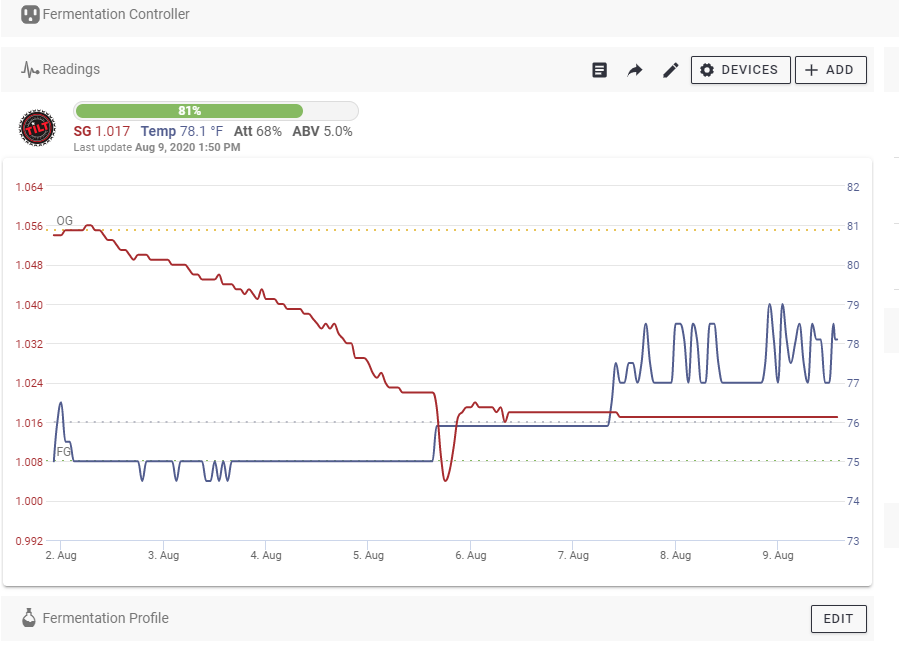I have made a Berliner Weisse with this yeast recently.
15L (4gal) batch, 1.034SG, 1.006FG
60% dingermans pils
30% weyermann malted wheat
10% malted oats
5 IBU mandarina bavaria @60min
5g irish moss @2 min
I rehydrated 1 pack of Philly sour, so that is about 0.73g/L pitch rate (the lallemand calculator said I needed only 7.5 grams for this batch which would be 0,5g/L pitch rate)
Pitched at 21°C (70°F) and fermented at 24-25C (75-77F)
PH got down to 3.35 by day 4 and it was done fermenting by day 10 at 1.006 SG which gives me 82% attenuation. I left it in the fermenter for a couple extra days just to be sure. Yesterday I´ve put half of it into the fridge to cold crash. It was already pretty clear for 30% wheat and 10% oats. I was thinking about adding gelatine but the yeast floculates like a champ so I dont think it will be necessary, I will probably just leave it in the fridge for another day and then bottle and re-yeast with ec-1118.
To the other half which is still on the yeast cake I added 455g (1lb) of frozen raspberries.
The sample I tasted yesterday had a great aroma of apricots/peaches (no apple) and it didnt smell sour but rather sweet which was surprising to me, taste was clean, with nice sournes although I would have liked if the ph was closer to 3.5
I will let you guys know how it went in a couple of weeks.
Also any idea if it would be safe to add some lactose to the one with raspberries ? The Philly sour shouldnt be able to ferment lactose right ?
Thanks for sharing your experience so far.
As for your question on milk sugar, I'll let everyone know in a few weeks. I've had this recipe on deck for a while and planned on kettle souring like I have in the past, but I'm going to try the Philly on it on 8/16. I'll report back once I have some info.
Raspberry Smoothie Sahr
Boil Time: 60 min
Batch Size: 6.5 gallons (fermentor volume)
Boil Size: 8.2 gallons
Boil Gravity: 1.054
Efficiency: 75% (brew house)
Original Gravity: 1.068
Final Gravity: 1.019
ABV (standard): 6.47%
IBU (tinseth): 0
SRM (morey): 3.81
Mash pH: 0
FERMENTABLES:
5 lb - Pilsner (33.8%)
5 lb - Wheat Malt (33.8%)
2 lb - Flaked Oats (13.5%)
1.5 lb - Lactose (Milk Sugar) - (late addition) (10.1%)
5 oz - Acidulated (2.1%)
16 oz - Cane Sugar (6.8%)
HOPS:
2 oz - Cascade (7 AA), Type: Pellet, AA: 7, Use: Whirlpool for 20 min at 160 °F
2 oz - Citra (11 AA), Type: Pellet, AA: 11, Use: Whirlpool for 20 min at 160 °F
2 oz - Mosaic (12.5 AA), Type: Pellet, AA: 12.5, Use: Whirlpool for 20 min at 160 °F
1 oz - Cascade (7 AA), Type: Pellet, AA: 7, Use: Dry Hop for 10 days
1 oz - Citra (11 AA), Type: Pellet, AA: 11, Use: Dry Hop for 10 days
1 oz - Mosaic (12.5 AA), Type: Pellet, AA: 12.5, Use: Dry Hop for 10 days
MASH GUIDELINES:
Temp: 156 F, Time: 60 min, Amount: 9.01 gal
OTHER INGREDIENTS:
0.5 oz - Sweet Orange Peel 15 min left in Boil
6 lbs 2 oz - Vintner's Harvest Raspberry Puree in Secondary
0.5 oz - Sweet Orange Peel in Secondary



































![Craft A Brew - Safale BE-256 Yeast - Fermentis - Belgian Ale Dry Yeast - For Belgian & Strong Ales - Ingredients for Home Brewing - Beer Making Supplies - [3 Pack]](https://m.media-amazon.com/images/I/51bcKEwQmWL._SL500_.jpg)


























